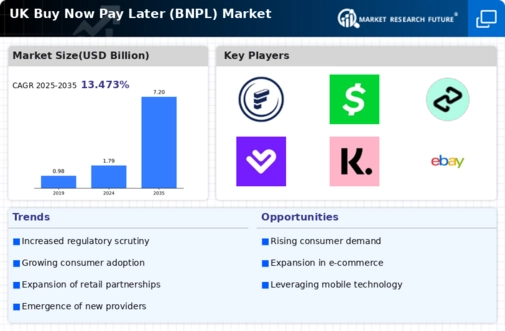The UK buy now pay later market is characterized by a dynamic competitive landscape, driven by evolving consumer preferences and technological advancements. Key players such as Klarna (Sweden), Clearpay (Australia), and Zilch (UK) are at the forefront, each adopting distinct strategies to enhance their market positioning. Klarna (Sweden), for instance, has focused on expanding its product offerings and enhancing user experience through innovative technology, while Clearpay (Australia) has emphasized partnerships with major retailers to increase its market penetration. Zilch (UK) has carved a niche by promoting its unique approach to credit, which allows consumers to manage their finances more effectively. Collectively, these strategies contribute to a competitive environment that is increasingly centered around customer-centric solutions and technological integration.
In terms of business tactics, companies are increasingly localizing their operations and optimizing supply chains to better serve the UK market. The competitive structure appears moderately fragmented, with several players vying for market share, yet the influence of major companies is palpable. This fragmentation allows for diverse offerings, catering to various consumer segments, while also fostering innovation as companies strive to differentiate themselves in a crowded marketplace.
In December 2025, Klarna (Sweden) announced a strategic partnership with a leading UK retailer to enhance its in-store payment solutions. This move is significant as it not only broadens Klarna's reach but also integrates its services into the physical retail space, thereby enhancing customer engagement and driving sales. Such partnerships are likely to become a cornerstone of Klarna's strategy as it seeks to solidify its presence in the UK market.
In November 2025, Clearpay (Australia) launched a new feature that allows users to manage their payment plans directly through a mobile app, enhancing user experience and engagement. This initiative underscores Clearpay's commitment to digital transformation and reflects a broader trend within the industry towards mobile-first solutions. By prioritizing user experience, Clearpay positions itself as a leader in customer satisfaction, which could translate into increased loyalty and market share.
In October 2025, Zilch (UK) introduced a sustainability initiative aimed at promoting responsible spending among consumers. This initiative not only aligns with growing consumer demand for ethical practices but also differentiates Zilch in a market where sustainability is becoming increasingly important. By focusing on responsible credit usage, Zilch may attract a demographic that values ethical considerations in their purchasing decisions.
As of January 2026, the competitive trends within the UK buy now pay later market are increasingly defined by digitalization, sustainability, and the integration of artificial intelligence. Strategic alliances are shaping the landscape, enabling companies to leverage each other's strengths and enhance their service offerings. Looking ahead, competitive differentiation is likely to evolve from traditional price-based competition to a focus on innovation, technology, and supply chain reliability. Companies that can effectively harness these trends will likely emerge as leaders in this rapidly changing market.






















